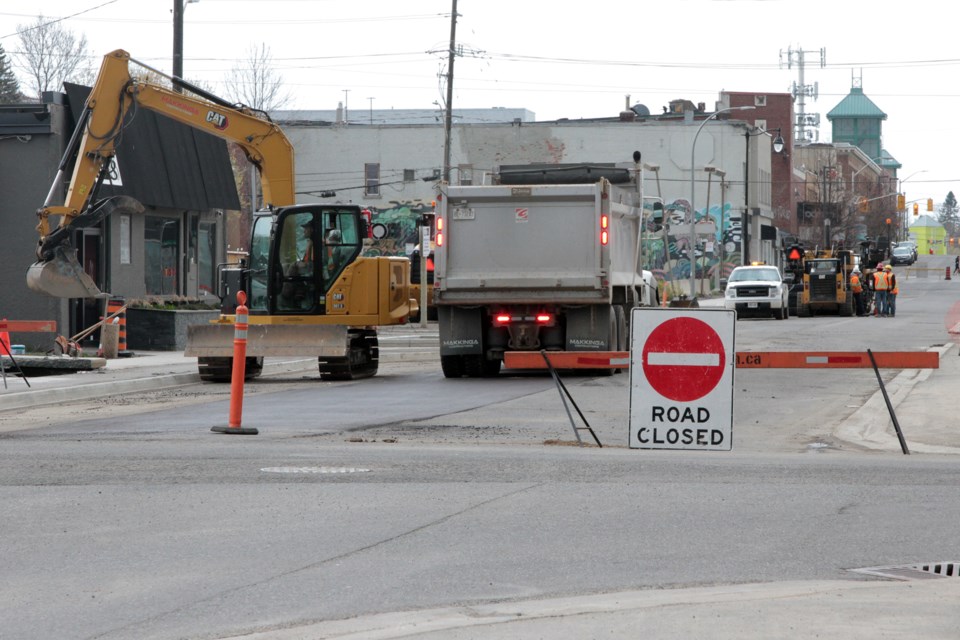THUNDER BAY — The City of Thunder Bay and Matawa First Nations each scored large contributions as the provincial government announced over $4 million in Northern Ontario Heritage Fund Corporation grants on Tuesday.
The announcement of over $4.3 million in NOHFC funding brought good news for the reconstruction of Thunder Bay’s north core and Matawa’s training and wellness centre on Algoma Street, as well as four other area projects.
The City of Thunder Bay received $2 million for the north core reconstruction, Thunder Bay–Atikokan MPP Kevin Holland announced in a press conference at city hall Tuesday morning.
City council approved a $13.2-million contract for the two-year rebuild earlier this year. The city budgeted $8 million for the project in 2023, hoping to finance much of the rest through federal and provincial funding.
Municipal leaders are betting on the project to reinvigorate the city’s north core, rebuilding key stretches of Red River Road and Court Street with more space for pedestrians, markets, events, and greenery, while replacing century-old underground infrastructure.
Mayor Ken Boshcoff expressed sympathy for neighbourhood businesses that are facing temporary disruption, but said their patience will be rewarded.
“We know this is like planting a tree. It’s going to bloom and blossom and grow and be astonishing,” he said. “When the project [is] finished, people are going to go, ‘Whoa, I’m so glad we invested.’”
The city had also received $750,000 toward the downtown reconstruction through FedNor in 2022.
Holland said the project had potential to boost regional tourism efforts.
“We know the city of Thunder Bay receives a lot of visitors not just from local communities that come in to enjoy the waterfront, but we’ve had how many cruise ships come to Thunder Bay this year, for example?” he said. “Improving the downtown core will certainly enhance the attraction of Thunder Bay to visitors.”
The city also received an additional $523,458 to upgrade recreational facilities in preparation to host the 2024 Ontario Winter Games in February, bringing the NOHFC contribution for that purpose to over $1 million.
That will help the city revamp a three-metre diving platform, scoreboard and timing system, and squash court viewing windows at the Canada Games Complex, and add a new PA system and accessibility and technology upgrades at the Fort William Gardens, as well as add fibre internet at Delaney Arena, the city said.
The other recipient of a large NOHFC grant Tuesday was Matawa First Nations, which received just over $1.2 million to support construction of a dedicated cultural room at its training and wellness centre on Algoma Street.
The Matawa Training and Wellness Centre at the former Dawson Court building, which received substantial federal support and is set for an official opening later this year, will employ around 200 people offering health, employment, and education services, said Matawa CEO David Paul Achneepineskum.
Robin Haliuk, a social services coordinator with Matawa’s Awashishewiigiihiwaywiin program, said the cultural room forms a crucial part of the vision for the centre.
“It’s really going to be a huge benefit to individuals, both travelling [and] in-city Matawa members, a safe place, year-round, where we can do ceremony, cultural practices, gatherings, feasts, mini-pow wows, all of those things. We know culture builds resiliency, and the best way to do that is having accessible space [where] our members can be together and grow.”
The cultural room is expected to open on the centre’s lower level in the former auditorium space, with video conferencing capability, by spring of 2024.
The province announced another $320,294 NOHFC award to Thunder Bay-based KBM Forestry Consultants to purchase an aircraft and expand its flight training unit.
Also announced Tuesday was $130,000 for the Lakehead Region Conservation Authority to assist with upgrades at its Cascades Conservation Area.
The NOHFC dollars support a total $315,0000 project including recently-completed drainage improvements to the Cascades parking lot and a repaving of its accessible trail loop, as well as construction of an accessible washroom that will be finished later this fall.
CAO Tammy Cook called that a boon to the LRCA’s most popular conservation area, and the organization’s work to add accessible recreation opportunities across its sites.
Lastly, local Jasa Spring Water received over $124,000 to grow operations by purchasing equipment and constructing a new building.
Kari Jamsa, co-owner of the business, said Tuesday the grant will help Jasa expand into production of smaller single-use bottles in 500- and 750-millilitre sizes.
“Right now, we’re just a local company, but our dreams are bigger,” he said. “There’s a huge demand elsewhere in the world, like across the border… This is the way we’ll be able to reach the world.”
